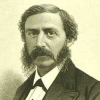Bret Harte

Bret Harte
Francis Bret Hartewas an American short story writer and poet, best remembered for his short fiction featuring miners, gamblers, and other romantic figures of the California Gold Rush. In a career spanning more than four decades, he wrote poetry, fiction, plays, lectures, book reviews, editorials, and magazine sketches in addition to fiction. As he moved from California to the eastern U.S. to Europe, he incorporated new subjects and characters into his stories, but his Gold Rush tales have been most...
NationalityAmerican
ProfessionNovelist
Date of Birth25 August 1836
CityAlbany, NY
CountryUnited States of America
Man has the possibility of existence after death. But possibility is one thing and the realization of the possibility is quite a different thing.
We begin to die as soon as we are born, and the end is linked to the beginning.
A bird in hand is a certainty. But a bird in the bush may sing.
But, when the goddess' work is done,The woman's still remains.
Hark! I hear the tramp of thousands, And of armèd men the hum; Lo, a nation's hosts have gathered Round the quick alarming drum Saying, Come, Freemen, Come! Ere your heritage be wasted, Said the quick alarming drum.
Each lost day has its patron saint!
Thiar ain't no sense In gittin' riled!
Crude at first [the short story] received a literary polish in the press, but its dominant quality remained. It was concise and condense, yet suggestive. It was delightfully extravagant - or a miracle of understatement
Which I wish to remark-- And my language is plain,-- That for ways that are dark And for tricks that are vain, The heathen Chinee is peculiar.
And then, for an old man like me, it's not exactly right,This kind o' playing soldier with no enemy in sight.
The delicate thought, that cannot find expression, For ruder speech too fair, That, like thy petals, trembles in possession, And scatters on the air.
Don't be too quickTo break bad habits: better stick,Like the Mission folk, to your arsenic.
When folks find I ain't afeard to speak my mind on their affairs, they kinder guess I'm tellin' the truth about my own.
Howbeit, though no scholar, I am not one of those who misuse the English speech, and, being foolishly led by the hasty custom of scriveners and printers to write the letters "T" and "H" joined together, which resembleth a "Y," do incontinently jump to the conclusion the THE is pronounced "Ye,"--the like of which I never heard in all England.